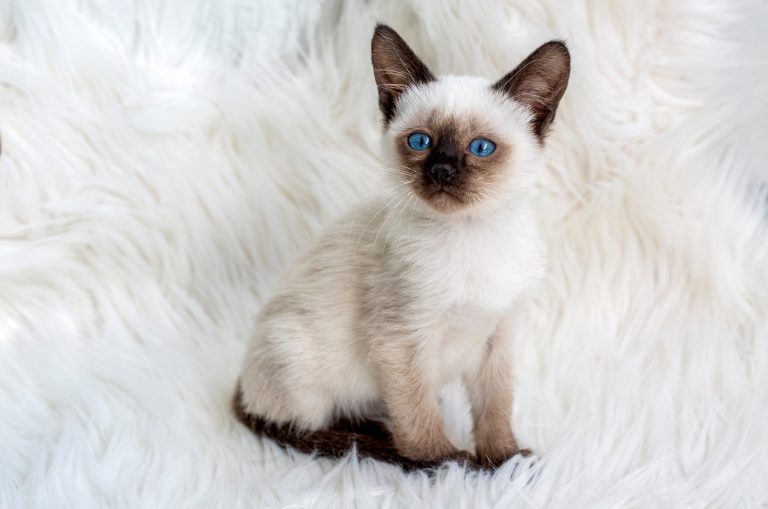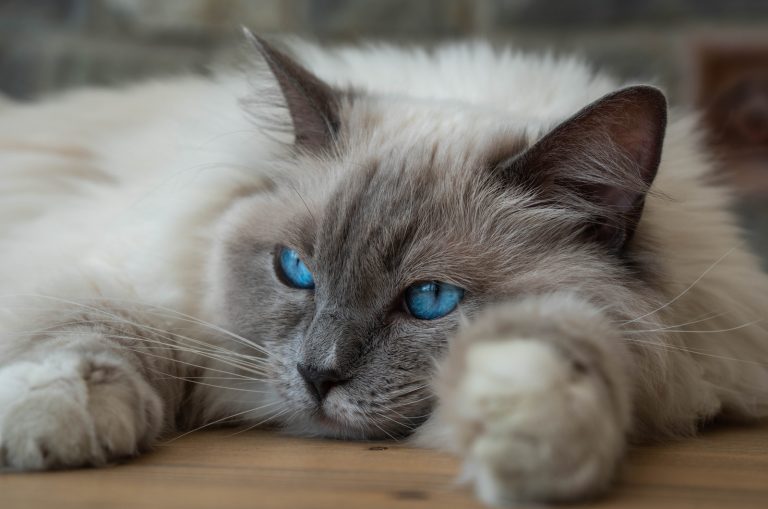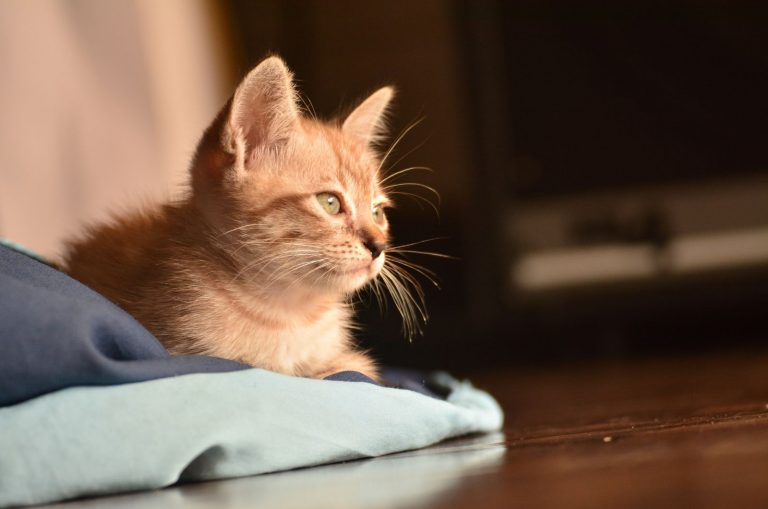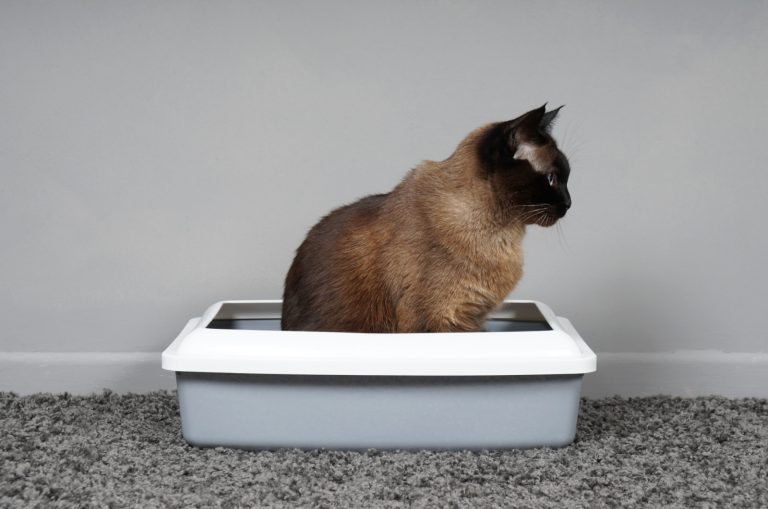12 Signs Your Cat Is Dying And Things You Should Do About It
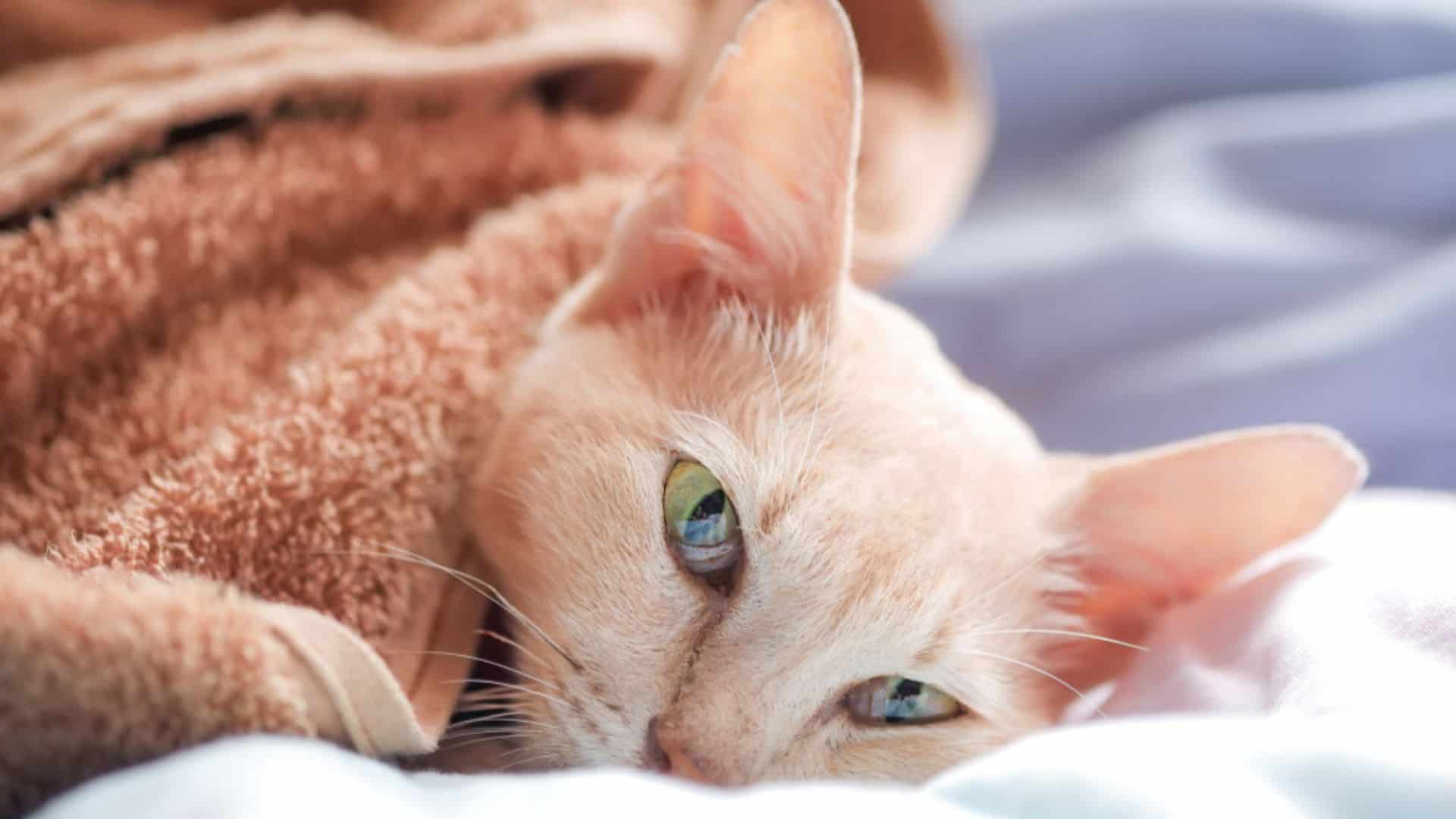
Every cat parent, including me, is aware of the fact that we won’t be able to enjoy time with our feline friends fur-ever.
If you’re lucky, you’ll spend a long life with your cat until it grows old, but on the other hand, you never know which day will be your cat’s last.
I know that many cat owners try to avoid this topic, and I know that it’s hard to even think about it, but as we know that that day must come, there are certain things that you should know.
If you have a cat that has reached old age or a sick cat, then here are 12 signs your cat is dying so that you can recognize it on time and prepare yourself. This article will also provide you with tips on what to do after your feline dies, so read on and find out!
12 Signs Your Cat Is Dying
All cats age, therefore, it’s a normal thing that some day they will die, regardless of their quality of life. For most cat parents, the death of their cat is a real shock which is a normal response.
Because of that, here are the 12 most common signs your cat is dying that every cat parent should know. No matter how difficult it can be, it’s crucial to notice these signs and do what’s best for your furry friend.
1. Loss Of Appetite
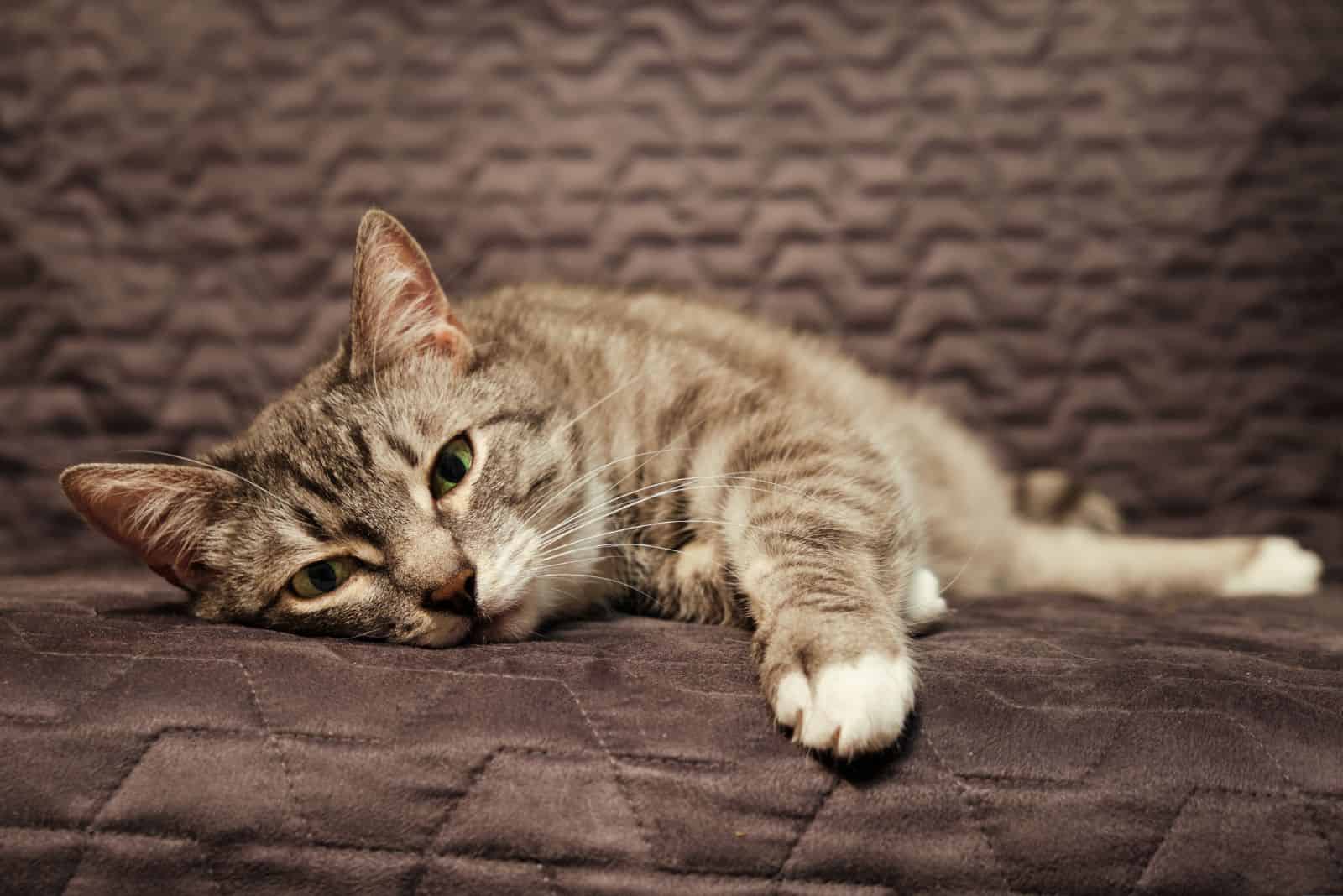
One of the first and most common signs that your kitty’s life is coming to an end is when it starts rejecting food and water. Your cat may stop eating the usual amount of food, or it may reject both food and water completely, which may affect the cat’s health very badly.
The main reason for this is that they’re weak and they don’t have the strength they used to have. Cats need a lot of energy to digest food; therefore, if they’re in pain, they won’t be able to do that, which is the main reason for their loss of appetite.
Cats can go without food for a few days, as long as they drink water. Therefore, if you notice that your cat won’t eat at all, find a way to keep your cat hydrated and take it to the vet to find the best possible solution.
2. Your Cat Is Weak And Lethargic
If your cat is old or sick, don’t be surprised if they’re not as energetic as before. In such cases, your cat is probably in great pain, which may be the main reason why it’s weak and lethargic.
When your cat is weak and lethargic, it won’t do much because it doesn’t have the energy or strength, especially in its hind legs.
They will sleep more than usual, they may start having frequent behavior changes. Due to being weak, they may even reject food or water, or any kind of interaction.
This may be a sign that your cat has counted its days. If that’s true, there’s not much you can do, but you can consult with your vet to provide your cat with pain relief medications so that your kitty’s not in pain at least.
3. Lack Of Grooming
Every cat lover and owner knows how much time cats spend on grooming themselves, but when your kitty becomes old and weak, you won’t see this as often.
Old and sick cats don’t groom themselves often as they’re in pain and because they’re not flexible as before. Because of that, their fur may look separated and messy, full of dead hair that hasn’t fallen out completely.
In that case, you should take the brush into your own hands and help your beloved cat. Senior cats require a lot of grooming to keep their coat in good and healthy condition, as they cannot do it by themselves.
So, when you notice a lack of grooming in your cat, don’t worry as it won’t die immediately. It means that its life is nearing an end, but it needs your help to spend these last days or months receiving a lot of love, affection, and care.
4. Your Cat Wants To Be Alone
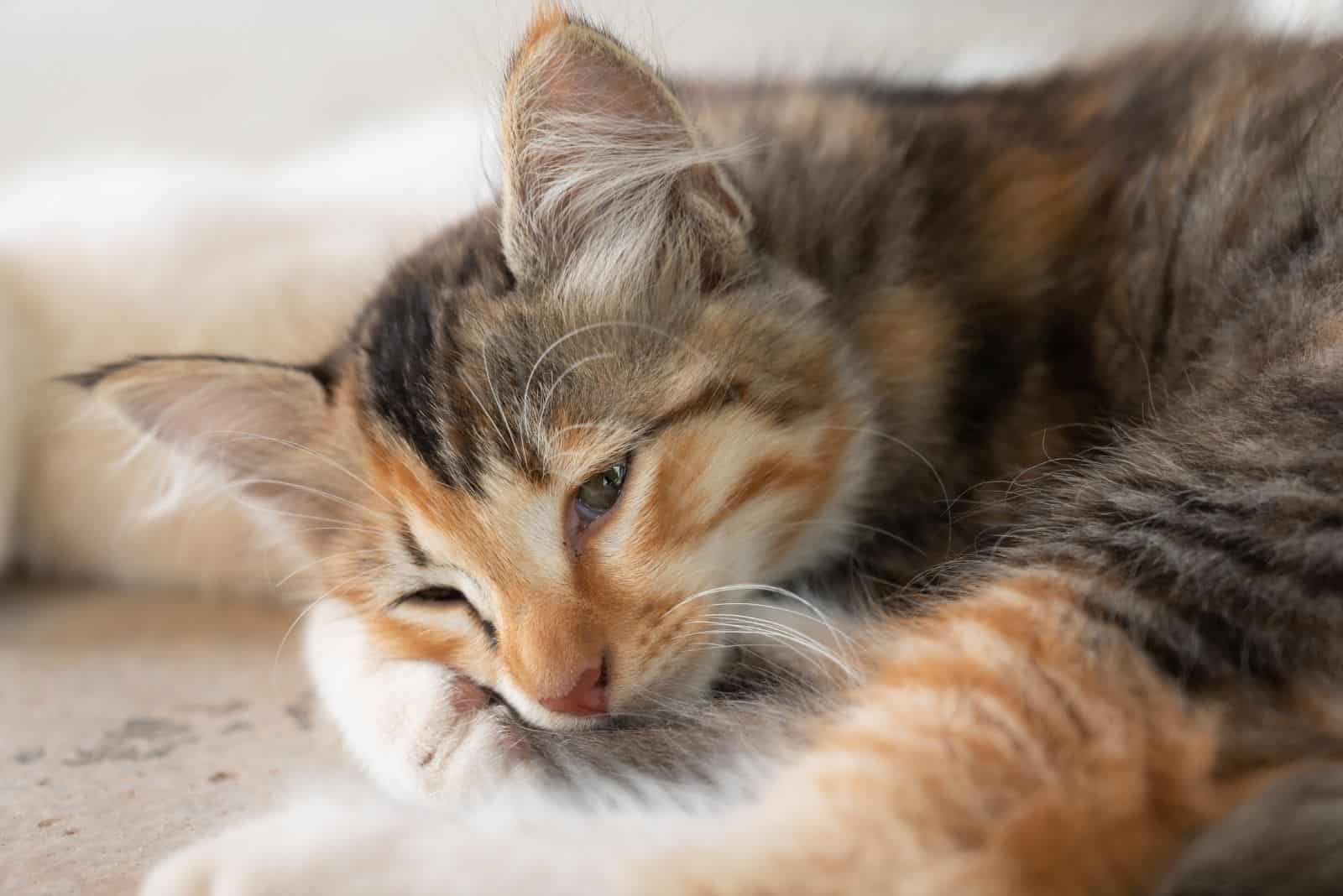
As you may know, it’s said that dogs will leave their homes when they sense that the end is near in order to die in peace. We can say that it’s the same with our cats.
Cats have remarkable senses; therefore, they’re able to detect certain illnesses, for example. Just like that, cats are also able to sense that their end is near and try to leave to die in peace.
If you have an outdoor cat whose life has come to an end, it’ll probably go somewhere far from your home to die in peace.
If you have an indoor cat, you may notice your kitty hiding often or wanting to be alone most of the time, as though it’s trying to tell you that they’re about to die and that they don’t need anything else from you.
So, if you notice such behavior in your cat, should you leave the cat alone? No, you shouldn’t let the cat out or leave it alone, but you should provide it with several calm spots where it can prepare itself for departure.
5. Low Body Temperature
Another sign that may indicate that the cat is about to die is a lower body temperature. The normal temperature of a cat is 100-102.5 Fahrenheit.
However, when a cat is about to die, its body is preparing for death, and its organs begin to shut down. Because of that, its body temperature may drop significantly below the normal temperature.
So, if you notice some of the previously mentioned signs, it would be good to check your cat’s body temperature with an ear or rectal thermometer and keep monitoring their body temperature as well as other signs so that you can keep the vet informed about your cat’s condition.
In case you don’t have a thermometer near you, you can check the cat’s temperature by feeling its paw pads, as they should be warm.
6. Your Cat Is Sleeping More Than Usual
Cats usually sleep during the day, and are active during dusk and dawn. However, if you have an older cat or a sick one, you may notice that they aren’t as active and they have less energy, so instead, they will sleep more than often.
I noticed these signs in my grandma’s elderly cat. The cat is very old, and even though she doesn’t show all of these signs, I noticed that she sleeps more than usual.
She’s always looking for warm spots such as a cat bed, under my blanket, near the fireplace or air conditioner, and similar.
By sleeping more than usual, our cats actually show us that they don’t have a lot of energy for different activities or play and that now they need a lot of rest.
I also noticed that my grandma’s cat started being more affectionate during the last few months, and she was never the affectionate cat but rather an independent one who didn’t want to be bothered at all.
That made me realize that this kitty is running her last lap.
7. Breathing Difficulties And Vision Problems
A normal healthy cat usually breathes 25-30 times per minute, but that is not the case with old and sick cats. So, if you notice your kitty breathing less than this or very fast and loud, it may be a warning sign which requires special attention.
In some cases, these breathing difficulties and issues may be a sign of certain health issues that can be treated, which is why it would be best to take your cat to the vet for an examination.
However, if you notice some of the previously mentioned signs along with this issue, unfortunately, it may be a sign your cat is dying.
Still, you can talk with your vet about what you should do for your feline friend or to find out if there’s anything you can do to make your kitty feel better.
Another problem, that may be a sign that your cat is nearing the end, is problems with vision.
For example, if you notice your cat bumping into the wall or other objects often, it may be that your cat has started to lose vision due to its age. Again, in this case, it would be best to take the cat to the vet to see if there’s anything they can do.
8. Your Cat Will Rapidly Start Losing Weight
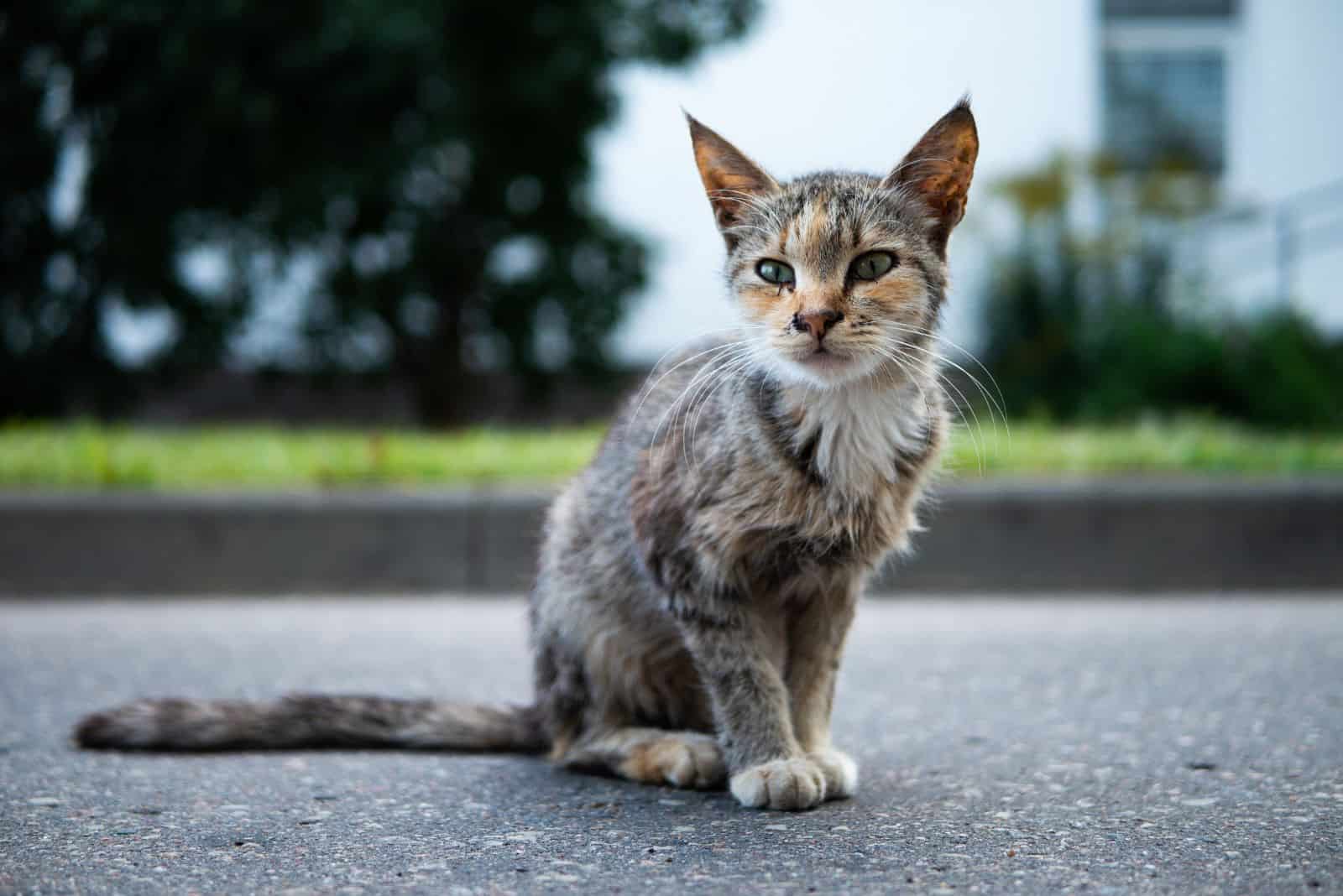
You may already know that the most common symptom of cats with some kind of health issue is weight loss. Just like that, sick or old cats who are about to die may rapidly start losing weight.
This can be a consequence of the previously mentioned loss of appetite. Of course, if your cat continues rejecting food, it won’t be able to receive nutrients and benefit from them, and it can experience weight loss and muscle wastage.
If you’re dealing with such a problem, you can consult with your vet on what you should do and how to encourage your kitty to eat. For example, you can provide them with cat food that contains high amounts of fiber to make it easily digestible and similar.
9. Check Your Cat’s Heartbeat
If you notice some of these signs, another thing you should pay attention to is tracking your cat’s heart rate.
A normal cat’s heartbeat can be between 140-220 beats per minute. If your cat’s heartbeat drops below the normal rate, it may indicate that death will be soon.
Therefore, if your kitty is weak and having other issues, I recommend you monitor its heartbeat this way:
• First, place your hand on the cat’s left side of the body, behind its front leg.
• Use a stopwatch to measure the number of cat’s heartbeats in 15 seconds and multiply that number by four to get the exact number of beats in a minute.
• If the number of heartbeats is below normal, you should take it to the vet so that they can continue examining your cat and try to help it feel better.
10. Your Cat Will Start Producing Odors
In case you notice your cat smelling differently than usual, that may be another sign your cat is dying, unfortunately. But how is that possible?
Well, when cats are about to die, their body and organs are slowly beginning to shut down. That leads to a build-up of toxins in your cat’s body instead of them being excreted.
Because of these toxins, your kitty may start smelling bad, which may point to certain issues with your cat, especially if the odor is getting worse.
11. Behavior Changes
Sudden behavior changes in our feline friends are never a good sign. Different cats have different personalities, but it’s true that they can change, and I have a perfect example of that.
Previously in the article, I mentioned my grandma’s cat, who was never an affectionate kitty, but rather enjoyed being independent and alone most of the time.
However, that same cat became extremely affectionate in its last few months, which was very surprising for everyone.
Besides that, cats may start showing changes in their routine, such as sleeping more than usual or being aggressive all of a sudden etc.
If you know what the usual behavior of your cat is, then you won’t have any problems noticing even the slightest changes in its behavior.
12. Your Cat Cannot Enter The Litter Box
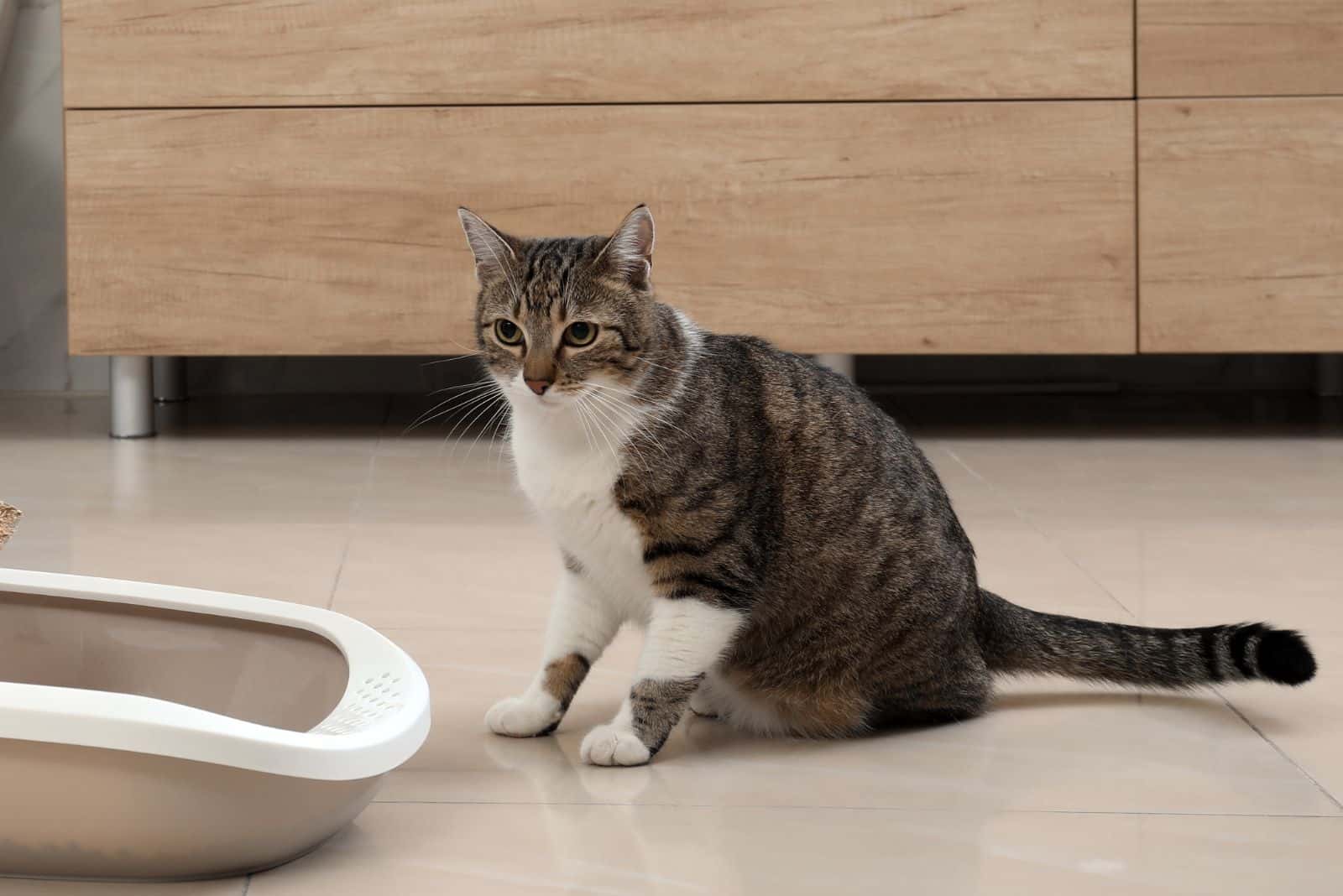
Most older cats don’t have enough energy to perform any activity, and that also includes getting into the litterbox.
Some cats may have joint problems making it even harder for them to enter the litter box. Unfortunately, if you don’t notice this issue, that may lead to eliminating outside the litter box and around your home, and when this is the case, you shouldn’t blame your cat.
Moreover, many old cats who are close to the end may lose control of their urinary and digestive tracts, which may lead to inappropriate elimination around your home.
So, to help your kitty, you can provide it with really low litter boxes that may be easier for them to use, or help them with getting in and out of the litter box.
It would also be a good thing to monitor their urine and poop, as they can have blood in urine due to low water intake or blood in their poop as a sign of serious health issues that will require a vet’s help.
How To Spend The Last Days With Your Feline?
If you notice that your beloved feline friend’s time has come to an end, it’s important to know how to spend your final days with it.
This is usually the hardest part for every cat owner because they’re aware of the situation, but still, everyone wants the best for their cat friends. So, here are some tips on what you should do!
Monitor Your Cat’s Behavior And Pain Level
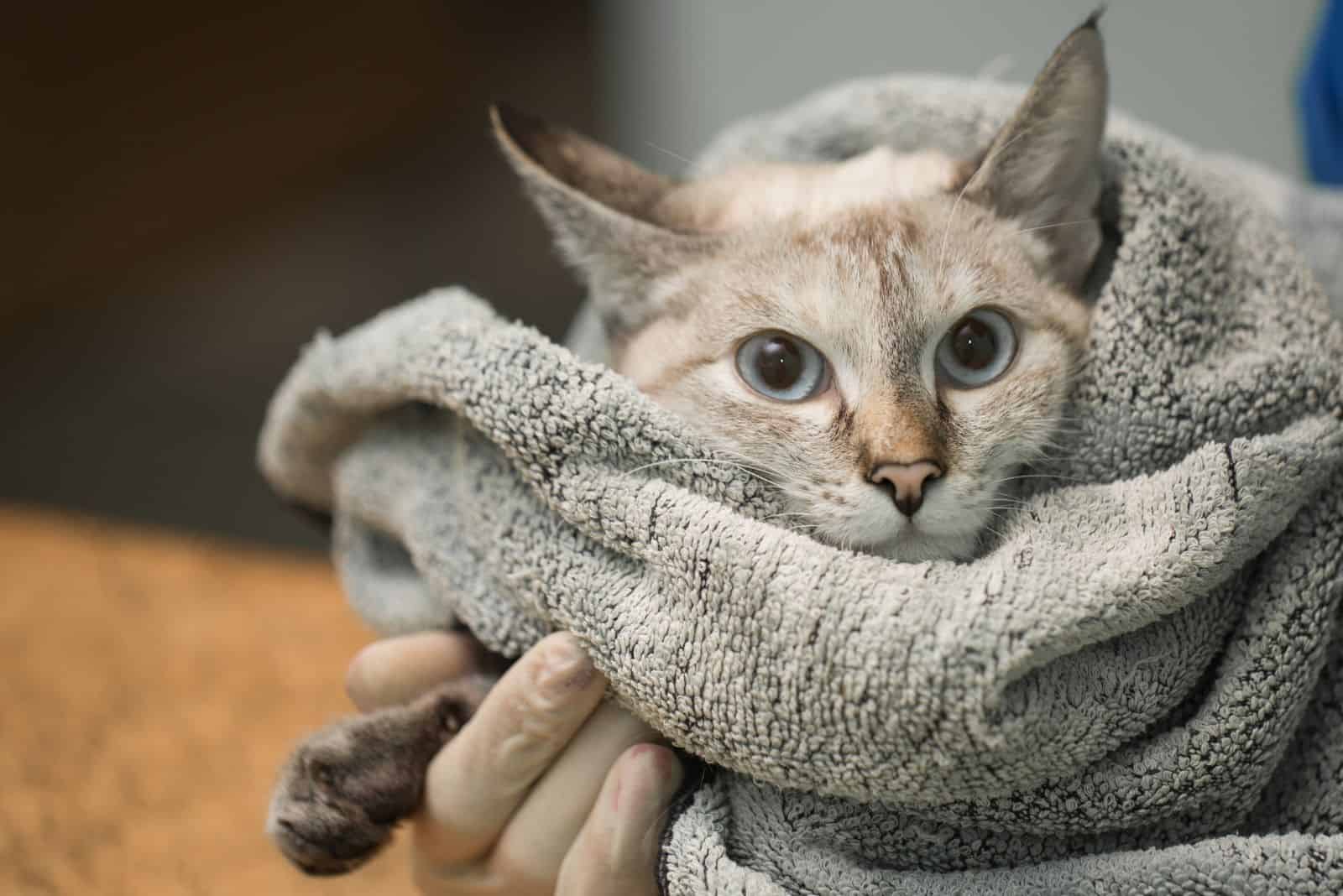
It’s essential to monitor your cat’s behavior and pain level as well. It’s known that cats may experience frequent behavior changes during their final days.
In order to control their behavior, make sure you provide your kitty with a calm, quiet, and stress-free environment so that it won’t be disturbed or stressed without reason.
Moreover, try to comfort your kitty and let it know that everything’s going to be alright, and try to spend more time with it so that the cat feels safe, loved, and protected.
As most cats are experiencing great pain during their final days, it’s crucial to monitor their pain level too.
Usually, cats won’t show that they’re in pain because they don’t want to show how vulnerable they are. However, the following signs may help you determine if your cat is in pain:
• Crying or aggressive behavior after being touched in a specific body area
• Loss of appetite
• Breathing difficulties or panting
• The cat is hiding more than usual
• Excessive licking of the painful area
If you notice such signs, you can take your cat to the vet to see if they can provide it with some pain relief medications and the best pet care to make it easier for them.
Provide Your Kitty With A Comfortable Cat Bed
Cats who are at the end of their life may sleep more than usual. Because of this, it is best to provide them with a warm, comfortable cat bed in a calm, quiet area where they’ll be able to rest.
As the cats will probably spend most of their time in their warm bed, it’s important that you often change and wash the bedding and blankets to keep them clean for your cat.
Remember that you should avoid using perfumed detergent as that can be irritating to them.
The bedding and blankets should always be kept clean, mostly because some cats may suffer from incontinence, so make sure that they always have a clean and dry place to sleep on.
Help Your Cat Use The Litter Box
If you want to avoid different urinating and defecating issues, it would be best if you help your cat use the litter box.
As they cannot move as before, they may start eliminating on the floor randomly because it’s difficult for them to get into the litter box. Because of that, it would be helpful to take your kitty to the litter box every few hours.
Another helpful solution is to provide them with extremely low litter boxes that can be easier for them to use.
Consult With Your Vet On What To Do Next
In such cases, I always recommend you consult with your vet about the cat’s end-of-life care. The vet will perform tests and diagnostics.
After that, depending on the cat’s condition, the vet may prescribe pain medications or equipment that will help the cat to eat and drink, and similar.
In this case, you can choose home hospice care, where you’ll take care of your cat on your own.
However, if you think that you can’t do it by yourself for certain reasons, then you may check the appointments with your vet so that they can provide the cat with the necessary treatments.
Moreover, in severe conditions, the vet may recommend euthanasia at home or in the clinic.
Even though this is never an easy choice, sometimes, when your kitty is suffering a lot, euthanasia is a more reasonable and humane choice rather than letting the cat suffer in great pain.
The process of euthanizing is painless, and it may take 10 to 20 seconds. The vet will administer a sedative and a medication that will cause death so that they can die peacefully without suffering anymore.
So, even though it may be a difficult decision, sometimes it’s the only right choice rather than watching your furry friend suffer more from day to day.
What To Do After Your Pet Cat Dies?

The period after your cat dies is difficult, how couldn’t it be? However, you need to understand that it’s all a part of life and that you need to go on.
Your beloved cat will always have a special place in your heart, but it’s up to you to accept that and move on.
So, to help you with that, here’s what you should do after your pet cat dies.
Decide What To Do With Your Cat’s Body
Taking proper care of your cat’s body is of great importance. If your kitty dies in your home, you should store its body by wrapping it in a bag carefully and keeping it in a cool place until you contact your vet. However, if your kitty is euthanized, worry not, as the vet will do this part for you.
After that, there’s another decision waiting for you; you have to decide whether you want cremation or burial for your furry friend.
If you choose cremation, you can consult with your vet or do research on where you can do it. If you choose a burial, you should also do research on local pet cemeteries where you can bury your pet, unless you already know one.
Make sure that you check your local laws before doing anything because, in some states, it’s illegal to bury your pet on your property or public land, while in other states, it’s legal.
Stay Strong
No matter how hard the death of your pet is, it’s important to stay strong. It’s normal to grieve for your pet or to be sad, but it’s also important to focus on your future.
You can try some new activities that will help you deal with your sadness, but an even better idea is adopting a new pet.
Adoption is always a good option; that way, you can help a new cat by providing it with a new and lovely home and yourself by having a new cat friend who will follow you on your next journey.
Still, if you continue having trouble grieving over your pet, you can ask for professional help that will help you get over it and move on with your life with memories of your beloved pet that will stay forever.
FAQ
Does A Cat Know When She’s Dying?
Cats have extremely sensitive senses that allow them to detect things that we can’t. For example, cats can sense bad energy or certain illnesses in humans and similar. Just like that, cats often know when they’re dying.
That may be the reason why they want to go away from their home or why they often hide because they don’t want others to see how vulnerable they are, and they simply want to die in peace.
How Can I Tell The Difference Between A Sick Cat And A Dying Cat?
Both sick and dying cats will be weak, lethargic, won’t eat or move a lot, and similar.
However, the main difference between the sick and dying cat is that dying cats will be even weaker than sick cats, they may start producing odors due to their organs shutting down, and they may try to escape, or hide, seeking solitude to die in peace.
Final Words
Finally, this article provides you with 12 signs your cat is dying as well as tips on what you can do for your cat during its final days and how to deal with the loss of your pet cat.
For most pet parents, this can be a very difficult period in their life. Because of that, it’s important to know these signs so that you can react on time and take your cat to the vet to see if there’s anything that can be done to prolong the cat’s life or just to make it easier for your cat to go through all of this.
If your adult cat has come to an end, try spending more time with it during these bad days; make it comfortable, and try to help it with the basic things, such as taking it to the litter box.
Through this period, it’s a good thing to consult with your vet to determine what’s best for your cat. If it’s in great pain, it may be the most humane choice to euthanize it. The decision may be hard, but at least the cat will no longer suffer.
Finally, it’s important to take proper care of the cat’s body after it dies and find the courage to move on. You may lose a pet, but I’m sure that its memory will last forever.
Related Content
• Will My Cats Spirit Visit Me? 19 Signs To Look For
• Putting A Cat Down With Stomatitis: What You Should Know
• When To Euthanize A Cat With IBD? Everything You Need To Know

